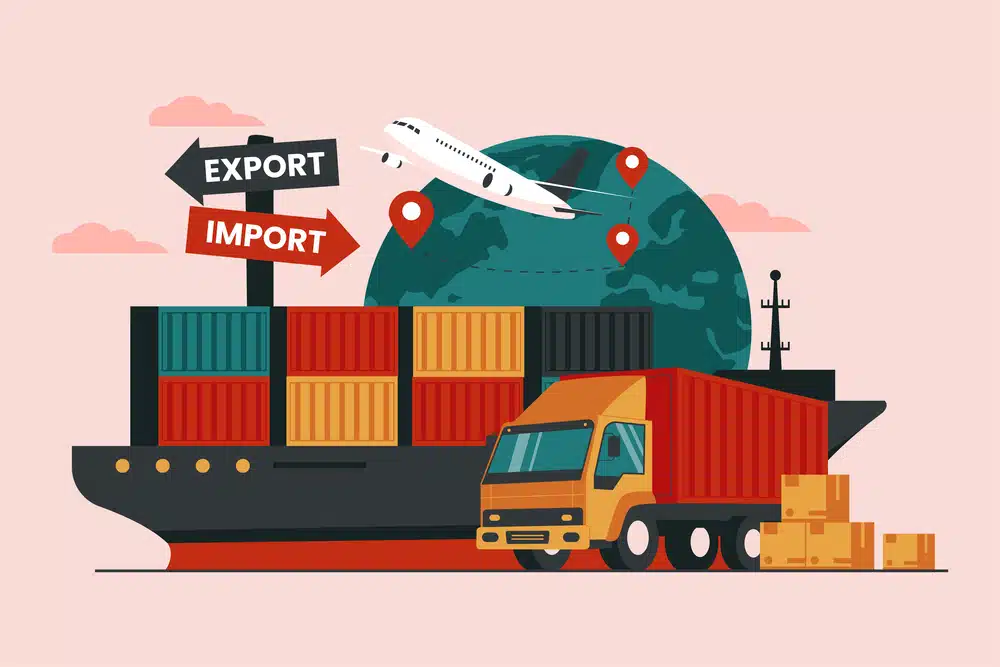Article At A Glance
- Tapping into emerging consumer trends allows businesses to solidify their global presence and adapt to changing demands.
- International trade helps businesses gain insights into global markets, tailor products to meet unique preferences, and access untapped customer bases.
- Improved logistics and trade liberalization have opened up opportunities for food businesses of all sizes to expand globally.
- Exporting offers the chance to reach new customers and higher-value markets while importing enables businesses to source ingredients or finished goods at lower costs.
The global food trade industry offers many opportunities for food businesses eager to expand and diversify. Importing and exporting enable companies to tap into new markets, reduce costs, and achieve sustainable growth. This blog explores why food businesses should consider these strategies, the key advantages of these strategies, and how collaborating with experts like B&B Food Services Inc. can smooth the path to success.
Essential Reasons For Importing and Exporting Goods
Expanding product lines or reducing production costs highlights international trade’s vast opportunities. Leveraging global supply chains and tapping into emerging consumer trends allow businesses to solidify their presence on the world stage. These strategies also equip companies with the agility to adapt to changing consumer demands.
Gaining more profound insights into international markets allows businesses to tailor their products to meet customers’ unique preferences across diverse regions. Whether it’s launching new product variations or exploring trending food categories, international trade opens doors to untapped customer bases, making it a cornerstone for sustained growth and success.
Extending to a Global Scale
Food businesses are no longer restricted to local or regional markets. With global trade liberalization, improved logistics, and technological advancements, international opportunities that once seemed out of reach are now within grasp. Regardless of size, whether a small producer or a well-established company, importing and exporting offer the chance to scale and maximize growth potential.
Exporting allows businesses to introduce products to underserved markets. By entering regions with increasing demand, companies can access higher-value customers. On the other hand, importing enables businesses to source ingredients, materials, or finished goods at lower costs, boosting profitability and providing access to unique products that may not be available locally.
Food trends, such as the rise of plant-based products and healthy eating, are driving growing demand in markets such as North America and Europe. Importing and exporting enable businesses to quickly adapt to these shifts in consumer preferences, capitalizing on the increasing demand for healthier, innovative options.
Market research can help food businesses identify opportunities abroad that complement domestic operations. The global nature of today’s food market makes it crucial for businesses to expand beyond national borders to stay competitive.
Increased Profits and Risk Mitigation
Many food businesses pursue importing and exporting to increase profits and mitigate risks. Companies can significantly enhance their bottom line by selling to international markets and importing products at favorable prices.
Boosting Revenue Streams
Exporting to high-demand markets offers substantial revenue growth potential. For example, a bakery selling organic baked goods could tap into the increasing demand for healthier options in regions like North America or Europe. By expanding into these markets, businesses reach new customers, driving sales volume, often at higher price points due to the perceived premium nature of their products.
Reducing Costs Through Imports
Importing raw materials or finished products from countries with lower production costs can help businesses reduce overall expenses. For instance, a food manufacturer might import exotic fruits from tropical regions at a fraction of the cost compared to locally sourced alternatives. This allows businesses to lower operational expenses, increase profit margins, and compete in price-sensitive markets.
Importing helps mitigate risk. A diversified supply chain with multiple sources for ingredients and products minimizes the impact of disruptions, such as crop failures or local economic downturns. For instance, a supplier in the United States might obtain coffee beans from Vietnam and Brazil. If weather issues disrupt one crop, the company can rely on the other, ensuring stable production.
Increased Competitiveness and Market Share
Importing and exporting equip food businesses with tools to enhance competitiveness and capture a larger market share. Access to international markets allows businesses to grow their brand presence globally, surpassing local competition in several regions.
Brand Recognition Across Borders
Exporting helps food businesses build a global brand reputation. As the brand reaches new customers in different markets, it strengthens its position locally and abroad. Consumers in international markets often perceive such brands as trusted providers of unique, high-quality products, thereby expanding the company’s influence.
Take a company that imports organic ingredients from sustainable farms worldwide. This strategy allows them to offer a diverse product range, which, in turn, helps establish their reputation for quality and ethical sourcing. As global consumers increasingly favor sustainable and eco-friendly products, such a brand resonates strongly with this growing base.
Competitive Advantage
Importing provides a competitive edge by offering unique products or ingredients that local competitors cannot. For instance, a company importing rare spices or specialty coffee beans can present consumers with products unavailable through domestic suppliers. This differentiation drives demand and builds customer loyalty, improving the company’s market position.
Both importing and exporting allow businesses to stay ahead of the competition by offering unique, high-quality products. Expanding to new regions strengthens market share and builds lasting success.
Economies of Scale and Government Support
Engaging in global trade brings the potential for economies of scale, reducing costs while increasing profitability. Many governments offer incentives and support to businesses that import or export, simplifying the process of international expansion.
Economies of Scale
As food businesses expand into international markets, they often increase their production volume, lowering per-unit costs. Larger production scales result in more cost-effective sourcing of raw materials, reduced shipping costs per unit, and better negotiating power with suppliers. These advantages allow businesses to lower overall operational costs, pass savings on to customers, and reinvest profits into further growth.
A business increasing its export volume to a particular country might achieve savings on shipping and customs clearance, which boosts profit margins. Bulk purchasing also allows companies to secure better rates when sourcing raw materials or finished goods.
Government Support
Many governments encourage international trade through support programs, including tax breaks, subsidies, and financial assistance for export-related activities. Some countries also incentivize businesses that source products from specific regions or create local jobs. These programs can help reduce financial burdens and enhance businesses’ ability to grow in global markets.
Understanding and leveraging government support can significantly boost food businesses and make the complexities of international trade more manageable. These programs often cover transportation costs, provide market-entry research assistance, and offer training to help businesses navigate international regulations.
Hiring Export and Import Assistance
While the benefits of importing and exporting are clear, navigating the complexities of global trade requires expertise. Without the proper support, managing tariffs, customs regulations, food safety, and quality standards can quickly become overwhelming.
Hiring professionals specializing in export and import assistance can help food businesses streamline operations and avoid costly mistakes. Working with experienced trade experts offers the following advantages:
Navigating Regulations
International trade regulations vary by country and can be difficult to manage. Importing and exporting goods involves adhering to specific customs regulations, ensuring product quality and safety standards, and paying the appropriate duties and taxes. A professional export and import consultant understands the regulations in various markets, helping businesses avoid delays and penalties.
Efficient Logistics
Logistics are crucial for the timely delivery of products, especially perishables. Experts can handle shipping, warehousing, and delivery to ensure products retain quality and arrive on time. These specialists can also help navigate challenges such as tariffs, packaging requirements, and handling perishable goods to prevent spoilage during transit.
Market Expertise
Export and import consultants often deeply understand regional markets and can offer valuable insights into consumer preferences, demand patterns, and industry trends. This knowledge allows businesses to develop more effective marketing strategies, better understand local consumer behavior, and make more informed decisions about which markets to target.
Hiring export and import professionals ensures that businesses can effectively manage the complexities of international trade, freeing them to focus on growth and global opportunities.
Additional Read: Transloading: Streamlining Your Food Supply Chain
Boost Profits and Cut Risks: B&B Food Services' Guide for Food Businesses
The global food trade offers vast opportunities for businesses to increase profitability, lower costs, and expand their market share. By leveraging importing and exporting strategies, businesses can grow their reach, stay competitive, and unlock new revenue streams.
Whether entering new markets, sourcing ingredients at better prices, or mitigating risks, the strategies discussed above provide a solid framework for success. Collaborating with an expert like B&B Food Services Inc. ensures businesses can confidently navigate global trade complexities while focusing on growth. Contact us at (815) 834-2621.

